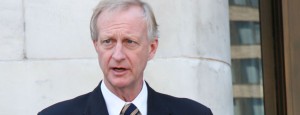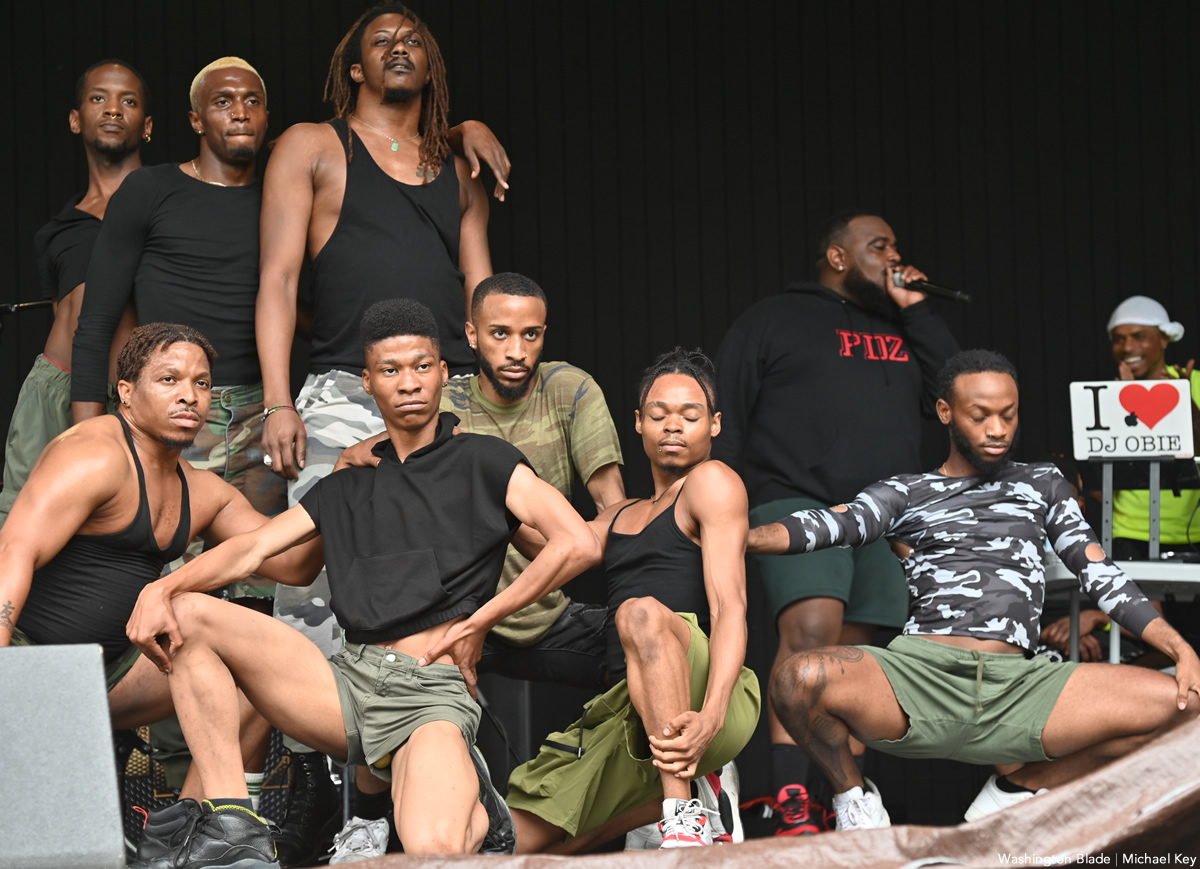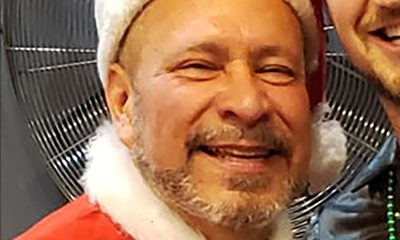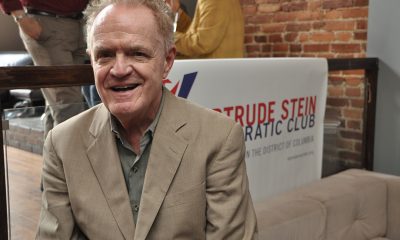Local
Evans, Brown enter race for Council chair
Anti-gay candidate runs in at-large contest

D.C. City Council member Jack Evans, seen here at an event celebrating the passage of same-sex marriage, is running for the Council chairman’s seat. He will run against Council member Kwame Brown. (DC Agenda photo by Michael Key)
D.C. City Council members Jack Evans (D-Ward 2) and Kwame Brown (D-At Large) have announced they are candidates for the Council chairman’s seat, creating another citywide contest where LGBT voters must choose between friends.
Evans and Brown entered the Council chairman race after the current chairman, Democrat Vincent Gray, declared his candidacy for mayor, challenging Mayor Adrian Fenty’s bid for a second term in September’s Democratic primary.
Much as they did with the mayor’s race, most gay Democratic activists have said they are not ready to take sides in the Council chair contest, expressing an interest in seeing the LGBT-friendly candidates for mayor and Council chair speak out on both gay and non-gay issues.
However, Evans’ strong support for LGBT rights extends over 20 years in his role as the Council’s most senior member. His longer record on LGBT issues is expected to give him an edge over Brown for the gay vote — at least in some parts of the city.
“We have a process for endorsing candidates and we’re going to follow that process,” said Jeffrey Richardson, president of the Gertrude Stein Democratic Club, the city’s largest LGBT political group.
In a timetable approved earlier this year, the club will hold an endorsement meeting June 14 for Democratic mayoral candidates, who will be invited to speak and answer questions from club members. The club is scheduled to vote on an endorsement after the candidates speak.
Stein Club officials scheduled a similar endorsement meeting July 12 for Democratic candidates running for the Council chairman seat as well as one of two at-large Council seats up for grabs, in which gay Democratic activist Clark Ray is challenging pro-gay Democratic incumbent Phil Mendelson.
City Council insiders have said Mendelson is considering running for the Council chairman seat now that Gray is giving it up to run for mayor. But unlike Evans and Brown, Mendelson remained silent this week on his intentions, leading some City Hall observers to speculate that he has decided to run once again for his at-large post.
A decision by Mendelson to give up his at-large seat to run for Council chairman was expected to greatly boost Ray’s chance of becoming the Council’s third openly gay member. Gay Council incumbents David Catania (I-At Large) and Jim Graham (D-Ward 1) are also up for re-election this year.
Meanwhile, in a little noticed development, gay rights opponent Richard Urban, who has testified repeatedly in favor of a ballot measure to kill the city’s same-sex marriage law, filed papers to run as an independent candidate for an at-large Council seat.
Under the city’s unusual election rule governing the Council’s at-large seats, Urban would be competing for the seat held by Catania, the author and lead advocate for the gay marriage law.
The city’s election law, which Congress wrote at the time it approved the city’s home rule charter in the early 1970s, requires at least one of the two at-large seats up for election this year to go to a non-majority party candidate. Since Democrats make up the majority party, only one of the two seats can go to a Democrat and both, theoretically, can go to a non-Democrat.
So far, Mendelson and Ray are the only Democrats competing for the Democratic nomination for the majority party seat. The Washington City Paper reported this week that Kelvin Robinson, who served as chief of staff to former Mayor Anthony Williams, is strongly considering entering the Democratic primary contest against Mendelson and Ray. Robinson is believed to share Williams’ strong views in support of LGBT rights, including same-sex marriage.
Most political observers consider Mendelson the strong favorite to win the nomination and the general election should he decide to stay in the race, with the gay vote expected to split between Ray and Mendelson. Mendelson, a longtime supporter of LGBT rights, is credited with shepherding Catania’s same-sex marriage bill through the Council in his role as chair of the committee with jurisdiction over the bill.
Urban’s candidacy, while considered a long shot, could potentially galvanize voters who oppose gay marriage, possibly turning Catania’s re-election bid into a surrogate referendum on marriage. Catania, however, could benefit from yet another independent candidate who also opposes same-sex marriage, Rev. Anthony Motley, who has been campaigning for the so-called non-Democratic at-large seat since June.
Unlike Urban, Motley has expressed support for LGBT rights in all areas other than marriage, saying he supports civil unions instead of same-sex marriage. Urban’s candidacy could potentially split the anti-same-sex marriage vote, strengthening Catania’s chances of winning the second, non-Democratic at-large seat.
In addition to opposing same-sex marriage and calling for a voter initiative to overturn the same-sex marriage law, Urban has campaigned against including gay-related content in the D.C. public school system’s sex education curriculum. He has also emerged as one of the city’s strongest advocates of abstinence until marriage as the main method of preventing the spread of HIV/AIDS. He’s expressed strong opposition to the city’s current policy of distributing free condoms to all groups considered at high risk for HIV, including high school students.
On his campaign web site, Urban lists at the top of his platform a call for “marriage defined as the union of one man and one woman only.” In a position paper on the city’s public schools curriculum, he calls for eliminating all references to sexual orientation and gender identity from school sex education courses — components of the curriculum that LGBT activists lobbied to put in place.
Urban, who is white, is expected to reach out to socially conservative black voters in wards 7 and 8, as well as in other parts of the city, who have expressed strong opposition to gay marriage.
Under the city’s election law, the two at-large seats are awarded to the two candidates — regardless of their party affiliation — who receive the highest vote counts in the general election in November.
Catania enjoys widespread support among voters across the city on a wide range of issues, and he’s considered the strong favorite to retain the non-Democratic seat. But Urban’s status as the first full-fledged anti-gay candidate to run for a City Council seat in many years is expected to put to the test the strength of a vocal group of socially conservative ministers who have vowed to push for the defeat of Council members who voted for the gay marriage bill.
Numbers filed with the city’s Office of Campaign Finance, however, show Urban had raised just $570 for his campaign as of the reporting period ending March 10, an amount that would lead most political observers to conclude he has yet to become a serious candidate.
Catania, by comparison, raised slightly more than $134,000 as of the same reporting period, according to records.
Each of the remaining Council members up for re-election this year have strong records of support for LGBT rights and each voted for the same-sex marriage bill. They include Graham (D-Ward 1), Mary Cheh (D-Ward 3), Harry Thomas (D-Ward 5) and Tommy Wells (D-Ward 6).
So far, each of the four is considered favorites to win re-election, although Graham and Thomas face candidates who could wage a competitive race. Gay marriage opponents in Ward 5 vowed to target Thomas for defeat. The views on same-sex marriage among three of the four candidates running against Thomas could not be immediately determined.
One of Thomas’s challengers, gay Republican Timothy Day, said he supports same-sex marriage and would run against Thomas on non-gay issues.
Among the few gay Democratic activists who have taken sides in the mayor’s race, most emerged as supporters of Gray, including two of the 12 openly gay members of the D.C. Democratic State Committee, the governing body of the city’s Democratic Party. Five of the gays on the committee said they would remain neutral in the race for the time being. Among the gay State Committee members remaining neutral is Stein Club Vice President Sheila Alexander-Reid, a prominent Fenty backer in 2006. Gay State Committee member Stephen Gorman did not respond to a call seeking his position on the mayor’s race.
But three prominent gay civic leaders this week said they enthusiastically support Fenty’s re-election, based on his approach to gay and non-gay issues. The three are Alex Padro, an elected Advisory Neighborhood Commissioner from the Shaw area; Scott Rogerson, president of the French Street Neighborhood Association in the Logan Circle area; and Martin Moulton, president of the Convention Center Community Association, which represents the neighborhood surrounding the D.C. Convention Center.
All three said Fenty’s administration took important steps to improve their respective neighborhoods. When asked whether they agreed with Fenty critics, including some in the gay community, that have described the mayor as aloof and not directly engaging community groups and rarely attending gay events, the three did not dispute that criticism but noted that the mayor’s personality didn’t bother them.
“I don’t have to have my mayor be touchy feely to make me happy,” Rogerson said. “I want him to be an effective mayor, keep the budget in line, and get projects done. I don’t need the warm hug, I need results, and he has produced results.”
Gay backers of Vincent Gray, including gay Democratic activist Lane Hudson, have said Fenty’s aloofness and failure to speak out publicly on issues like anti-gay hate crimes have prevented his administration from having a greater impact on such issues.
District of Columbia
New D.C. LGBTQ+ bar Crush set to open April 19
An ‘all-inclusive entertainment haven,’ with dance floor, roof deck

D.C.’s newest LGBTQ+ bar called Crush is scheduled to open for business at 4 p.m. on Friday, April 19, in a spacious, two-story building with a dance floor and roof deck at 2007 14th St., N.W. in one of the city’s bustling nightlife areas.
A statement released by co-owners Stephen Rutgers and Mark Rutstein earlier this year says the new bar will provide an atmosphere that blends “nostalgia with contemporary nightlife” in a building that was home to a popular music store and radio supply shop.
Rutgers said the opening comes one day after Crush received final approval of its liquor license that was transferred from the Owl Room, a bar that operated in the same building before closing Dec. 31 of last year. The official opening also comes three days after Crush hosted a pre-opening reception for family, friends, and community members on Tuesday, April 16.
Among those attending, Rutgers said, were officials with several prominent local LGBTQ organizations, including officials with the DC Center for the LGBTQ Community, which is located across the street from Crush in the city’s Reeves Center municipal building. Also attending were Japer Bowles, director of the Mayor’s Office of LGBTQ Affairs, and Salah Czapary, director of the Mayor’s Office of Nightlife and Culture.
Rutgers said Crush plans to hold a grand opening event in a few weeks after he, Rutstein and the bar’s employees become settled into their newly opened operations.
“Step into a venue where inclusivity isn’t just a promise but a vibrant reality,” a statement posted on the Crush website says. “Imagine an all-inclusive entertainment haven where diversity isn’t just celebrated, it’s embraced as the very heartbeat of our venue,” the statement says. “Welcome to a place where love knows no bounds, and the only color or preference that matters is the vibrant tapestry of humanity itself. Welcome to Crush.”
The website says Crush will be open Tuesdays and Wednesdays from 4 p.m. to 12 a.m., Thursdays from 4 p.m. to 2 a.m., Fridays from 4 p.m. to 3 a.m., Saturdays from 2 p.m. to 3 a.m., and Sundays from 2 p.m. to 12 a.m. It will be closed on Mondays.
Crush is located less than two blocks from the U Street Metro station.
District of Columbia
Reenactment of first gay rights picket at White House draws interest of tourists
LGBTQ activists carry signs from historic 1965 protest

About 30 LGBTQ activists formed a circular picket line in front of the White House Wednesday afternoon, April 17, carrying signs calling for an end to discrimination against “homosexuals” in a reenactment of the first gay rights protest at the White House that took place 59 years earlier on April 17, 1965.
Crowds of tourists looked on with interest as the activists walked back and forth in silence in front of the White House fence on Pennsylvania Avenue. Like the 1965 event, several of the men were dressed in suits and ties and the women in dresses in keeping with a 1960s era dress code policy for protests of the Mattachine Society of Washington, D.C., the city’s first gay rights group that organized the 1965 event.
Wednesday’s reenactment was organized by D.C.’s Rainbow History Project, which made it clear that the event was not intended as a protest against President Joe Biden and his administration, which the group praised as a strong supporter of LGBTQ rights.
“I think this was an amazing event,” said Vincent Slatt, the Rainbow History Project official who led efforts to put on the event. “We had twice as many that we had hoped for that came today,” he said.
“It was so great to see a reenactment and so great to see how far we’ve come,” Slatt said. “And also, the acknowledgement of what else we still need to do.”
Slatt said participants in the event who were not carrying picket signs handed out literature explaining the purpose of the event.
A flier handed out by participants noted that among the demands of the protesters at the 1965 event were to end the ban on homosexuals from working in the federal government, an end to the ban on gays serving in the military, an end to the denial of security clearances for gays, and an end of the government’s refusal to meet with the LGBTQ community.
“The other thing that I think is really, really moving is some of the gay staff inside the White House found out this was happening and came out to greet us,” Slatt said. He noted that this highlighted how much has changed since 1965, when then President Lyndon Johnson’s White House refused to respond to a letter sent to Johnson from the Mattachine Society explaining its grievances.
“So now to have gay people in the White House coming out to give us their respects and to say hello was especially meaningful to us,” Slatt said. “That was not expected today.”
Among those walking the picket line was longtime D.C. LGBTQ rights advocate Paul Kuntzler, who is the only known surviving person who was among the White House picketers at the April 1965 event. Kuntzler said he proudly carried a newly printed version of the sign at Wednesday’s reenactment event that he carried during the 1965 protest. It stated, “Fifteen Million Homosexuals Protest Federal Treatment.”
Also participating in the event was Japer Bowles, director of D.C. Mayor Muriel Bowser’s Office of LGBTQ Affairs. Bowles presented Slatt with a proclamation issued by Bowser declaring April 17, 2024, Mattachine Society Day in Washington, D.C.
“Whereas, on April 17, 1965, the Mattachine Society of Washington courageously held the nation’s inaugural picket for gay rights, a seminal moment in the ongoing struggle for LGBTQIA+ equality in the United States, marking the genesis of public demonstrations advocating for those rights and paving the way for Pride Marches and Pride celebrations worldwide,” the proclamation states.
About 30 minutes after the reenactment event began, uniformed Secret Service agents informed Slatt that due to a security issue the picketers would have to move off the sidewalk in front of the White House and resume the picketing across the street on the sidewalk in front of Lafayette Park. When asked by the Washington Blade what the security issue was about, one of the Secret Service officers said he did not have any further details other than that his superiors informed him that the White House sidewalk would have to be temporarily cleared of all people.
Participants in the event quickly resumed their picket line on the sidewalk in front of Lafayette Park for another 30 minutes or so in keeping with the 1965 picketing event, which lasted for one hour, from 4:20 p.m. to 5:20 p.m., according to Rainbow History Project’s research into the 1965 event.
Although the LGBTQ picketers continued their procession in silence, a separate protest in Lafayette Park a short distance from the LGBTQ picketers included speakers shouting through amplified speakers. The protest was against the government of Saudi Arabia and organized by a Muslim group called Al Baqee Organization.
A statement released by the Rainbow History Project says the reenactment event, among other things, was a tribute to D.C.-area lesbian rights advocate Lilli Vincenz, who participated in the 1965 White House picketing, and D.C. gay rights pioneer Frank Kameny, who founded the Mattachine Society of Washington in the early 1960s and was the lead organizer of the 1965 White House protest. Kameny died in 2011 and Vincenz died in 2023.
The picket signs carried by participants in the reenactment event, which were reproduced from the 1965 event, had these messages:
• “DISCRIMINATION Against Homosexuals is as immoral as Discrimination Against Negroes and Jews;”
• “Government Should Combat Prejudice NOT PROMOTE IT”
• “White House Refuses Replies to Our Letters, AFRAID OF US?
• “HOMOSEXUALS Died for their Country, Too”
• “First Class Citizenship for HOMOSEXUALS”
• “Sexual Preference is Irrelevant to Employment”
• “Fifteen Million U.S. Homosexuals Protest Federal Treatment”
District of Columbia
Organizers announce details for D.C. Black Pride 2024
Most events to take place Memorial Day weekend at Westin Downtown

The Center for Black Equity, the organizer of D.C. Black Pride, the nation’s first and one of the largest annual African-American LGBTQ Pride celebrations, announced this year’s event will take place Memorial Day Weekend from May 24-27.
The announcement, released April 16, says that most 2024 D.C. Black Pride events will take place at the Westin Washington, D.C. Downtown Hotel at 999 9th St, N.W.
“With the theme Black Pride Forever, the event promises a weekend filled with vibrant celebrations, empowering workshops, and a deep exploration of Black LGBTQIA+ history and culture,” the announcement says.
It says events will include as in past years a “Rainbow Row” vendor expo at the hotel featuring “organizations and vendors created for and by the LGBTQIA+ community” offering products and services “that celebrate Black excellence.”
According to the announcement, other events include a Health and Wellness Festival that will offer workshops, demonstrations, and activities focused on “holistic well-being;” a Mary Bowman Poetry Slam “showcasing the power and beauty of spoken word by Black LGBTQIA+ artists;” the Black Pride Through the Decades Party, that will celebrate the “rich history of the Black LGBTQIA+ movement;” and an Empowerment Through Knowledge series of workshops that “delve into various topics relevant to the Black LGBTQIA+ community.”
Also, as in past years, this year’s D.C. Black Pride will feature its “Opening Night Extravaganza” reception and party that will include entertainment and live performances.
The announcement notes that D.C.’s annual Black Pride celebration, started in 1991 as a one-day outdoor event at Howard University’s Banneker Field, has inspired annual Black LGBTQ Pride events across the United States and in Canada, United Kingdom, Brazil, Africa, and the Caribbean. More than 300,000 people attend Black LGBTQ Pride events each year worldwide, the announcement says.
Full details, including the official schedule of events, can be accessed at dcblackpride.org.
-

 Africa4 days ago
Africa4 days agoCongolese lawmaker introduces anti-homosexuality bill
-

 World4 days ago
World4 days agoOut in the World: LGBTQ news from Europe and Asia
-

 District of Columbia3 days ago
District of Columbia3 days agoReenactment of first gay rights picket at White House set for April 17
-

 Africa3 days ago
Africa3 days agoUgandan activists appeal ruling that upheld Anti-Homosexuality Act












